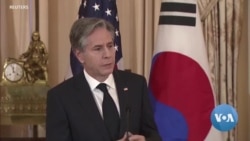The top U.S. diplomat heads to Beijing to try to reset tense relations with China.
Welcome to VOA Asia Weekly. I'm Chris Casquejo in Washington. That story is coming up, but first, making headlines:
Nearly one thousand fishermen and activists rallied in Seoul Monday to protest against the planned release of nuclear wastewater from Japan’s Fukushima Daiichi power plant disabled by an earthquake and tsunami. The Tokyo Electric Power Company maintains that it can safely treat the wastewater to dilute the nuclear isotopes in it.
The Mayon Volcano in the Philippines continued to erupt in the early hours of Wednesday morning, with large amounts of smoke and gas emanating from the peak, as truckloads of villagers fled its base to avoid a potential worse eruption.
A Chinese navy training ship with hundreds of cadets on board made a port call in the Philippines on Wednesday, the final stop on a goodwill tour of four countries as Beijing looks to cool tensions in the region.
White House National Security Advisor Jake Sullivan took part in “the first-ever trilateral meeting of the Japanese, Philippine, and U.S. national security advisors" in Tokyo Thursday. Sullivan's visit came after U.S., Japanese and Philippine coast guard ships staged law enforcement drills in waters near the disputed South China Sea earlier this month.
U.S. Secretary of State Antony Blinken is heading to China later this week, a trip that was rescheduled from February after a suspected Chinese spy balloon flew through U.S. airspace. VOA’s Nike Ching reports expectations are low that Blinken’s trip will be able to reset the two countries’ fraught relationship.
A day before the U.S. military shot down a Chinese surveillance balloon ...
Secretary of State Antony Blinken postponed his meetings in Beijing and U.S.-China ties hit a new low.
"China's decision to fly a surveillance balloon over the continental United States is both unacceptable and irresponsible. That's what this is about. It's a violation of our sovereignty, it's a violation of international law."
After a few months, the top U.S. diplomat said it is essential for the two countries to maintain regular lines of communication.
''It’s clearly in the interest of both countries - the most dangerous thing is not to communicate and as a result to have a misunderstanding, a miscommunication.''
The Pentagon also wants Beijing to answer a military hotline so generals can talk during incidents like last week’s close encounter involving U.S. and Chinese ships in the Taiwan Strait.
Observers say despite the tensions, both governments are trying to set up a summit later this year.
“Both countries are working toward a possible meeting between Biden and Xi Jinping at the APEC meeting which will take place in San Francisco in November, and in order to have a successful summit, if that is indeed on the agenda, there needs to be a lot of preparation.”
While Washington is seeking to re-engage Beijing on the issues of counternarcotics and climate change, congressional critics are skeptical the two countries can have a substantial change in the status of their relationship.
Nike Ching, VOA News.
The United States and India are poised to announce deeper cooperation in technology and manufacturing in the coming days — particularly in the defense space. Next week, Prime Minister Narendra Modi travels to the U.S. for the first Indian state visit in nine years.
The Biden administration is set to sign off on a deal to allow General Electric to produce jet engines to power Indian military aircraft.
But Congress must also approve the deal.
Improving the Indian defense industrial base is a priority of the Modi government, and New Delhi and Washington both see a common threat — from Beijing.
And business leaders are calling on the U.S. and India to reaffirm their goal of reaching $500 billion in bilateral trade.
Experts say now is the time for India to benefit from the global effort to “de-risk” from China.
Modi has been invited to give an address to a joint meeting of the U.S. Congress on June 22nd, laying out his vision for the future of U.S.-India relations.
Visit voanews.com for the most up-to-date stories.
Thanks for watching VOA Asia Weekly. I’m Chris Casquejo. Until next week.
We leave you now in Seoul where legions of the BTS army from across the world gathered at sites connected to their favorite music idols to celebrate the 10th anniversary since the band's debut.











